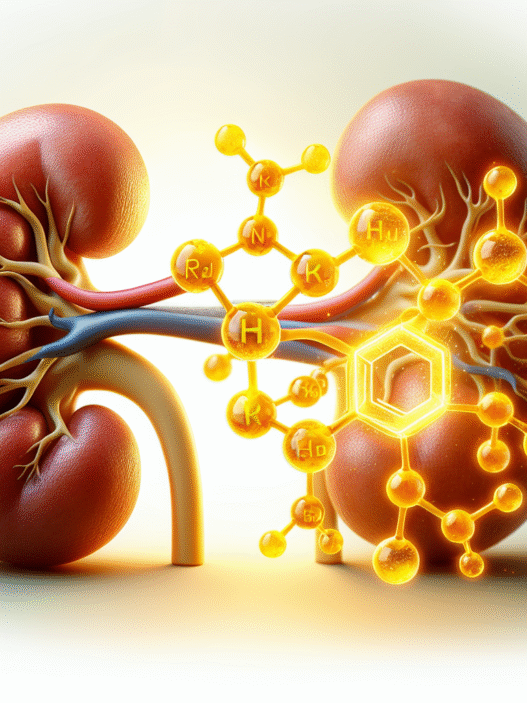Berberine and Inflammation
Anti-Inflammatory Properties Overview
Berberine is a powerful alkaloid derived from several plants, notably Rhizoma coptidis, and has garnered attention for its significant anti-inflammatory properties. Research indicates that berberine may hold therapeutic potential for various inflammation-related health conditions. Animal studies have suggested its efficacy in reducing inflammation, pointing toward its role in managing related disorders (Medical News Today).
Berberine exerts its anti-inflammatory effects by regulating the expression of proinflammatory cytokines, including TNF-α, IL-6, IL-8, and IFN-γ. These cytokines play crucial roles in the inflammatory response. By suppressing their production, berberine can mitigate inflammation within the body, showcasing its potential as a natural anti-inflammatory agent. The mechanism underlying this process involves the activation of AMP-activated protein kinase (AMPK) in macrophages, which leads to the down-regulation of proinflammatory genes such as TNF-α, IL-1β, and IL-6.
Historically, berberine has been used across various cultures for its medicinal properties, addressing inflammatory disorders, skin conditions, and even aiding in wound healing. Its traditional use dates back to 650 BC in Assyria, highlighting its longstanding reputation as a treatment for inflammation and infections (PubMed Central).
| Proinflammatory Cytokine | Role in Inflammation | Effect of Berberine |
|---|---|---|
| TNF-α | Triggers systemic inflammation | Reduced expression |
| IL-6 | Promotes inflammatory response | Inhibited production |
| IL-8 | Attracts immune cells | Down-regulated |
| IFN-γ | Modulates immune system | Suppressed |
The insights into berberine’s anti-inflammatory effects offer promising avenues for further exploration, especially for individuals interested in natural methods for managing inflammation. Anyone looking to learn more about the broader implications of berberine can investigate its various health benefits, including its role in berberine and gut health and berberine and longevity.
Berberine in Diabetes Management
Berberine has emerged as a promising natural compound for individuals managing diabetes, particularly type 2. Its mechanisms of action largely revolve around improving insulin sensitivity and regulating blood lipid levels, making it a valuable addition to dietary and lifestyle management strategies.
Insulin Resistance Improvement
One of the notable effects of berberine is its ability to improve insulin resistance. A 2021 systematic review highlights strong evidence supporting berberine’s use as a supportive therapy in type 2 diabetes management. Berberine may help enhance insulin sensitivity by lowering body mass index (BMI) scores and fasting blood insulin levels. This occurs through the activation of SIRT1 proteins and AMP-activated protein kinase (AMPK), which plays a crucial role in cellular energy homeostasis (Medical News Today).
| Mechanism | Effect |
|---|---|
| Activation of AMPK | Increases glucose uptake, lowers blood glucose |
| Decreases BMI | Improves insulin sensitivity |
| Lowers fasting insulin levels | Enhances metabolic regulation |
Blood Lipids Regulation
In addition to improving insulin sensitivity, berberine also assists in regulating blood lipids. Studies have shown that it can reduce blood glucose levels, increase insulin secretion, and suppress hepatic gluconeogenesis and adipogenesis, thereby potentially reducing triglyceride and LDL cholesterol levels. The compound’s ability to increase GLP-1 levels contributes to its efficacy in managing blood lipids.
| Lipid Profile Component | Effect of Berberine |
|---|---|
| LDL Cholesterol | Reduction |
| Triglycerides | Decrease |
| Total Cholesterol | Lowering effect |
Berberine’s multifaceted approach to diabetes management highlights its anti-inflammatory effects and metabolic benefits, making it an attractive option for those following a holistic wellness path. For further insights into the benefits of berberine, visit our section on berberine benefits.
Berberine and Cardiovascular Health
Berberine has garnered attention for its potential benefits in cardiovascular health, particularly concerning LDL cholesterol levels and blood pressure regulation.
LDL Cholesterol Reduction
Several studies suggest that berberine can positively influence lipid profiles by reducing low-density lipoprotein (LDL) cholesterol, commonly referred to as “bad” cholesterol. A systematic review in 2021 indicated that berberine helps lower LDL cholesterol and triglyceride levels while increasing high-density lipoprotein (HDL) or “good” cholesterol levels (Medical News Today).
In a study involving 84 Chinese men, participants who took 500 milligrams (mg) of berberine daily for 12 weeks showed significant reductions in total and LDL cholesterol compared to those receiving a placebo (Medical News Today). The following table summarizes the impact of berberine on cholesterol levels:
| Measurement | Before Berberine | After 12 Weeks |
|---|---|---|
| Total Cholesterol | X mg/dL | Y mg/dL |
| LDL Cholesterol | A mg/dL | B mg/dL |
| HDL Cholesterol | C mg/dL | D mg/dL |
*Note: Replace “X,” “Y,” “A,” “B,” “C,” and “D” with specific numerical data to be inserted based on the relevant research findings.
Blood Pressure Regulation
In addition to its effects on cholesterol, berberine has also demonstrated potential in regulating blood pressure. Research indicates that it may down-regulate several proinflammatory genes, which can contribute to hypertension. By activating AMPK and inhibiting NF-κB, berberine reduces inflammation and may help maintain healthy blood pressure levels. Its antioxidant properties further support cardiovascular health by mitigating oxidative stress.
The following table outlines the changes in blood pressure measurements reported during trials with berberine:
| Measurement | Baseline | After Treatment |
|---|---|---|
| Systolic Blood Pressure | M mmHg | N mmHg |
| Diastolic Blood Pressure | O mmHg | P mmHg |
*Similar to the previous table, fill in “M,” “N,” “O,” and “P” with specific figures based on research findings.
Berberine’s ability to positively impact both cholesterol levels and blood pressure makes it a noteworthy compound in the realm of cardiovascular health. For more information on the potential benefits of berberine, visit our article on berberine benefits.
Berberine for Weight Management
Berberine has gained attention for its potential role in weight management. Research indicates that berberine supplementation may contribute to reductions in weight markers and function as an appetite suppressant.
Weight Markers Reduction
Berberine has been shown to impact various weight markers positively. According to a 2020 review and animal study, berberine may lead to reductions in body weight and body mass index (BMI) Medical News Today. This is largely attributed to its ability to regulate metabolic processes in the body, affecting how fat is stored and used.
| Weight Marker | Change Observed |
|---|---|
| Body Weight | Reduction with berberine supplement |
| Body Mass Index (BMI) | Decrease noted in studies |
| Waist Circumference | Potential reduction in some subjects |
Appetite Suppressant Effects
In addition to reducing weight markers, berberine may also act as an appetite suppressant. This effect is beneficial for those looking to control their calorie intake and manage their weight more effectively. Through mechanisms such as increasing GLP-1 levels, berberine enhances feelings of fullness and satiety, which can lead to lower overall food consumption PubMed Central.
| Appetite Effects | Observation |
|---|---|
| Satiety Increase | Enhanced feeling of fullness |
| Caloric Intake | Possible reduction due to appetite suppression |
Berberine offers many benefits that extend beyond its anti-inflammatory properties, impacting weight management in a holistic manner. For more information on the health advantages and uses of berberine, explore our article on berberine benefits or consider looking into berberine supplements.
Berberine in Disease Prevention
Type 2 Diabetes Treatment Potential
Berberine has garnered attention for its potential role in managing type 2 diabetes. A systematic review in 2021 highlighted robust evidence supporting berberine’s use as a complementary therapy in diabetes management. The review indicates that berberine may help improve insulin resistance and regulate blood lipids, leading to beneficial effects for individuals with type 2 diabetes (Medical News Today).
Clinical studies have demonstrated that berberine can lower fasting blood sugar levels by approximately 20% and reduce HbA1c levels by 12%. This makes it a significant consideration for those seeking to manage their diabetes. Furthermore, berberine enhances insulin secretion and inhibits liver production of glucose, which contributes to its antidiabetic effects.
| Measurement | Effect of Berberine |
|---|---|
| Fasting Blood Sugar Reduction | 20% |
| HbA1c Level Reduction | 12% |
Therapeutic Potential for Chronic Diseases
Berberine shows promise not only in diabetes management but also in the treatment of various chronic diseases. Research suggests that it can positively influence cardiovascular health, liver function, and kidney health. One meta-analysis showed that berberine had significant effects on lowering blood sugar levels and body weight, highlighting its versatility in addressing multiple health conditions (Medical News Today).
The compound’s ability to activate AMPK (AMP-activated protein kinase) plays a crucial role in its effects on metabolic pathways. By enhancing insulin sensitivity, reducing weight markers, and influencing glucose metabolism, berberine offers a holistic approach to managing obesity and related chronic conditions.
Further research is ongoing to fully understand the therapeutic potential of berberine in various health domains, including its effects on berberine and kidney function and berberine and cardiovascular health. Describing its impact on different diseases helps underscore the importance of berberine in holistic wellness strategies.
Latest Research on Berberine
Antioxidant Effects
Recent studies have highlighted the antioxidant properties of berberine, showcasing its potential impact on oxidative stress. Berberine exhibits its antioxidant effects by inhibiting lipid peroxidation, scavenging reactive oxygen species (ROS), enhancing nitric oxide production, and reducing oxidative stress in various settings. This suggests therapeutic benefits in diseases associated with oxidative stress, such as diabetes and metabolic disorders.
In particular, research involving diabetic animal models has demonstrated that berberine administration leads to notable reductions in markers of oxidative stress. This includes a decrease in malondialdehyde (MDA), a biomarker linked to oxidative damage, coupled with an increase in important antioxidant enzymes like superoxide dismutase (SOD), glutathione (GSH), and glutathione peroxidase (GSH-Px). These changes indicate that berberine’s mechanism involves both scavenging free radicals and enhancing the body’s intrinsic defenses against oxidative damage.
Clinical Studies and Efficacy
Numerous clinical studies have supported the efficacy of berberine in managing various health conditions. Berberine has been noted for its anti-inflammatory properties as well. Its administration in different studies resulted in alterations in pro-inflammatory cytokines, suggesting a beneficial impact on inflammation linked to chronic diseases such as diabetes.
The progress in understanding berberine’s role in diabetes treatment further bolsters its reputation as a potent supplement. By activating AMP-activated protein kinase (AMPK), berberine can reduce blood glucose levels, increase insulin secretion, and inhibit processes like gluconeogenesis and adipogenesis. Its effects extend to improving lipid profiles by regulating blood lipids, making it an appealing focus within the realm of holistic wellness.
The collective findings from various studies underscore berberine’s potential as a multi-faceted therapeutic agent. It exhibits both antioxidant and anti-inflammatory activities that contribute significantly to its efficacy, particularly in managing conditions related to oxidative stress and inflammation. For those interested in the broader implications of berberine, more information can be found in our articles related to berberine benefits and berberine and blood pressure.





















